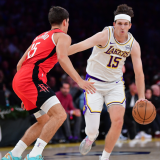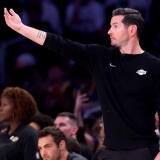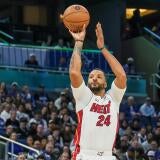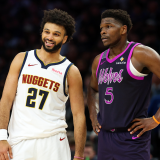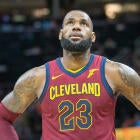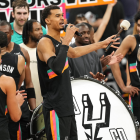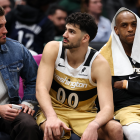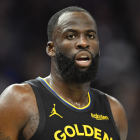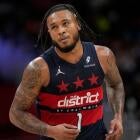
Behind the Cavaliers' defensive disaster -- and, yes, LeBron is part of the problem
The King is the best player on the Cavs but he has had defensive issues this season

LeBron James put on a clinic against the Wizards on Friday night. He finished with 57 points, 11 rebounds, seven assists and shot an astounding 23 of 34 from the field. He was an unstoppable monster.
He also had to be.
In that game, the Cavaliers surrendered 122 points, good for a pace-adjusted defensive rating of 116. To put that in perspective, the Cavs have only scored more points per possession than that three times this season. If James doesn't go off -- completely off -- they lose that game. In related news, the Cavaliers surrendered 117 points and a 109 defensive rating to the now 2-9 Atlanta Hawks on Sunday.
Cleveland is 30th in points allowed per possessions -- dead last in the league, for a team expected to contend for a fourth straight NBA Finals appearance. The common narrative around the team is that they are "coasting," that it's about how little the Cavaliers care about the regular season. To be sure, they don't. This team has messed around in each of the last three seasons and still made the Finals. However, bad habits have become indelible elements of the team's identity, and the situation is getting worse.
So what's the problem? Why is Cleveland this bad, and what can be done about it? Let's answer some questions about this.
Will the Tristan Thompson injury make them worse?
Last week, when Tristan Thompson was declared out for several weeks with a calf injury, the idea was that it would hamper any sort of ability for the Cavaliers to stem the bleeding. But that's not necessarily the case.
The reality is ... the defense probably isn't going to get much worse, for two reasons:
1. Thompson was not discernibly helping the defense.
2. The Cavs honestly cannot get worse.
Here's the thing: Thompson was a legitimately terrific defender for years and a big part of the reason the Cavs shocked the world in winning the title in 2016. But something has been sliding since then.
These numbers are points allowed per 100 possessions:

So that's a pretty startling trend. The Cavs' defense was good seasons years ago, and better with Thompson on the court. It was considerably worse the season after, and the gap between Thompson on and off court was smaller. This season, it's catastrophic, and only slightly worse with Thompson on the floor.
All of this can be visualized in sequences like the following inbounds play. As the Pelicans run Jrue Holiday off an off-ball screen, Thompson switches onto him. This happens all the time. The Cavs switch almost everything off-ball this season. That winds up with Holiday with Thompson on him in isolation. Two seasons ago, Thompson showed his value as being one of the best in containment on guards in these kinds of situations. However, when a big is on a guard, it's usually a losing proposition, as it is here. Watch the backline rotation defense from Kevin Love and James:
And even when they don't attack Thompson, they're still forcing the off-ball switch to bring him out of the play and spreading him to the perimeter. Teams are essentially saying, "If you have one rim protector, and a bunch of guys we can beat off-ball to force help, we're going to just remove that rim protector."
Why are the Cavs so bad defensively?
So now we come to the crux of the situation with the Cavaliers. How are they the 30th-ranked defense in the NBA?
- They are chock full of minus defenders, from Derrick Rose to Kyle Korver (who is being targeted now that he's 36) to Channing Frye. Dwyane Wade has been surprisingly decent this year, both by eye test and the metrics. J.R. Smith is a complete mess right now, and Jae Crowder is still learning teammates, schemes and habits. The problem starts with everyone else, particularly the perimeter guys.
- The aforementioned issue of teams spreading Thompson to the perimeter, which both opens an attacking lane and forces the defense to collapse.
- A genuine lackluster effort, which is what everyone paints the entire problem on. It's part of the issue; it is not the silver bullet. If they tried harder, things would not be fixed. And finally ...
- LeBron James is surrendering an absolutely insane amount of spot-up shots, given his role and reputation.
I can walk you through the issues of the first three, but if you watch the Cavs, it's pretty obvious. LeBron is so concerned with Korver in isolation on Jonathon Simmons here that he just leaves his man to show on Simmons, which means Thompson helps down to cover his man in the corner. Then Korver thinks he needs to help down on Thompson's man, as Thompson rushes back to his man at the same time, and ...
This is the root of the Cavaliers' issues defensively.
Take a wild guess at where the Cavaliers rank in pick-and-roll defense this season. Just a wild guess for the 30th-ranked defense? Bottom 20, that sound about right?
The Cleveland Cavaliers are No. 1 -- the best team in the NBA -- at defending shots from the ball-handler in pick-and-roll situations. They have contained it. Watch Love handle the drive of a more athletic player. You see this over and over again:
It's everything that comes out of it that they fall apart in.
The Cavaliers in various play-set defensive ranks, per Synergy Sports:
- Isolation: third-most points allowed, second-highest points per possession allowed
- Transition: 19th-most points allowed, 11th-highest points per possession allowed
- The real killer? Spot-ups: third-most points allowed, second-highest points per possession allowed, accounting for 20 percent of all of their field goals allowed.
Jae Crowder has given up the most spot-ups for the Cavs, which isn't surprising. Crowder's on a new team, being asked to adapt to an ever-changing role, and he's consistently tasked with guarding the toughest perimeter weapons on the wing. He's given up 50 points off spot-up plays. Only one player is anywhere close to him.
LeBron James.
The greatest elephant of all time in the room
Via NBA.com, let's look at what happens when Thompson, a good defender, is on the court with LeBron in comparison to when James is off court, which isn't often. James is playing the sixth-most minutes in the NBA right now. However:
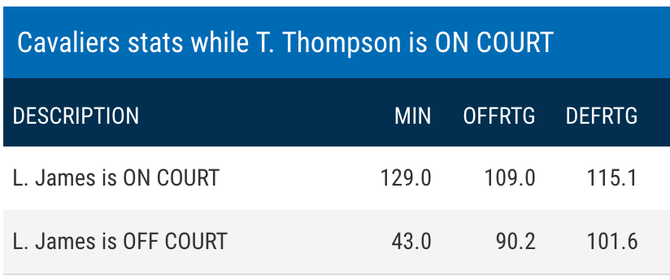
You'll notice the offense plummets into a sad little cavern of self-loathing there. However, look at that. They are 15 points better defensively with Thompson on the floor and James off.
Now, Thompson and James are worse with Love on the floor. But even when Love is off the floor, Thompson and James are giving up 110 points per 100 possessions. That's a terrible mark.
Watching those spot-up plays, you notice a culprit over and over again. The problem with the eye test is that you will develop cognitive biases to what you see. Logging the spot-ups surrendered by the Cavs, about one in every four was the result of either James himself falling asleep, over-helping or ball-watching, or as a result of something else James did. Using individual examples of plays ignores all the other times when James makes sound decisions and closes out hard. However, watch this sequence:
The first four times I watched this, I thought the Cavs were running some sort of matchup-zone hybrid. It's only until you go frame by frame that you see what happens. James starts on Otto Porter, Rose is on Bradley Beal, Crowder is on Markieff Morris. James walks right by Porter to go up and help in the pick and roll, which the Cavs easily contain. Morris comes up to set another screen, which Crowder comes up to defend. Notice that James doesn't go to defend that action; he doesn't think Morris is his guy. His guy is still Porter. James tells Rose to stay with the corner man; he's clearly not switching onto him.
James spends that entire possession watching the on-ball action while Porter loops around the baseline unencumbered for a catch-and-shoot 3-pointer.
OK, that's one play. How about this one? James is matched up on Knicks guard Frank Ntilikina. This is a rookie; there's not going to be much of a scouting report on the kiddo yet. But he's a point guard, and he's a known 3-point threat, right? Watch James. Don't watch the ball. Watch James:
Below, James is in the pick and roll vs. Spencer Dinwiddie here. They don't switch the pick and roll (the Cavs aren't switching on-ball, just off), and guess what? Love contains the ball-handler and the roll man. Crowder and Smith both make good recoveries. Watch James the entire possession:
After containing the pick and roll, James doesn't get back out to cover Dinwiddie. Maybe that's actually Thompson's assignment, and James is supposed to switch onto Thompson's man on the corner. James goes for neither.
These are all examples, and there are examples of bad defense by every player, even the great ones. You'll find bad sequences from Kawhi Leonard last season. Everyone has dips. The issue is that these plays come on top of poor closeouts and good ol' fashioned jumpers over James.
The key is that this is the biggest problem area for the Cavs. Teams take spot-up shots more than any other type. They score at a higher rate than anything but transition. And James is a big issue within this function. There are plenty of reasons for this; if you notice James is often watching the rest of the action because he pretty clearly is concerned about having to make up for other issues. He's also carrying an incredible offensive load, which means he just can't give max effort on every closeout and possession.
The point is not that James is the problem with the Cavaliers' defense. Their hazmat zone of a defense is the result of a grand cacophony of old legs not moving fast enough, poor attention to detail, bad luck and mass failure. However, the narrative that the rest of the Cavs are dragging down James isn't exactly on point.
What's to be done?
First and foremost, the Cavs have roster issues. Iman Shumpert is the one player consistently offered in trade talks, and Shumpert is the only rotation player with a defensive rating under 100. The Cavs tried to add a rim protector last season, but Andrew Bogut was injured in the first game. The Cavs have added shooters (Frye, Korver, Calderon), and then value veteran wings (Rose, Wade) and discount multi-position forwards like Jeff Green, but they haven't added rim protectors or real playmakers to take that burden off James.
Their ability to negotiate a deal to improve the roster is compromised, though. Shumpert's trade value is low on account of his offense, James has Smith's back in any situation despite Smith having the worst defensive rating of any player on the Cavs and shooting 29 percent from 3-point range. The Cavs' one ace in the hole is the Nets' pick from the Isaiah Thomas trade, which may not wind up that great by the time the lottery rolls around. They need to wait on using that to see how the season is going, and if there's any hope of keeping James this summer.
In the meantime, is it reasonable to expect an improved effort? Yes, and the communication issues should resolve themselves as well, but remember this isn't a one-year issue. The Cavs' defense wasn't good last season and it didn't matter until the Finals ... when it mattered a great deal. The general consensus is that the Cavs can struggle however much, still make the playoffs in the East and then win with a very simple formula of "having LeBron James."
So the question you have to ask if whether you believe there's a level of poor defense that could compromise their chances, and what the ceiling for this team really will be? Even if they manage to improve defensively, can they improve to a top-five spot? If not, do they have any chance against the Warriors? And if not ... where is this team going, now, in the future, at all?



